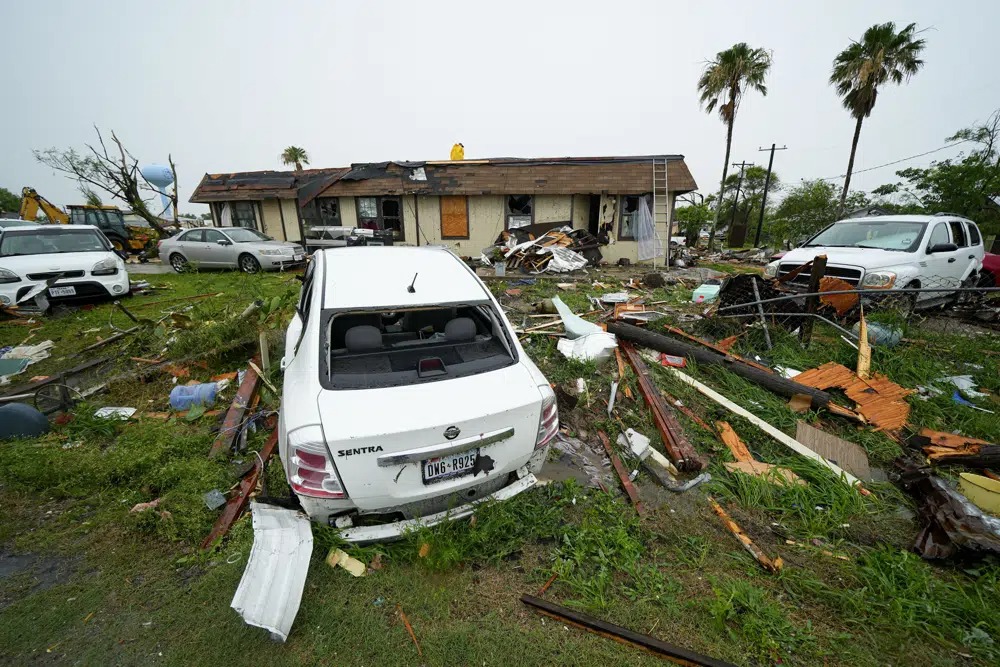Nearly 12,000 extreme weather, climate and water-related events over much of the past half-century around the globe have killed more than 2 million people and caused economic damage of $4.3 trillion, the U.N. weather agency said Monday.
The stark recap from the World Meteorological Organization came as it opened its four-yearly congress among member countries, pressing the message that more needs to be done to improve alert systems for extreme weather events by a target date of 2027.
The Geneva-based agency has repeatedly warned about the impact of man-made climate change, saying rising temperatures have increased the frequency and intensity of extreme weather — including floods, hurricanes, cyclones and drought.
WMO says early warning systems have helped reduce deaths linked to climate and other weather-related catastrophes.
Most of the economic damage between 1970 and 2021 came in the United States — totaling $1.7 trillion — while nine in 10 deaths worldwide took place in developing countries.
WMO Secretary-General Petteri Taalas said the cyclonic storm Mocha that swept across Myanmar and Bangladesh this month exemplified how the “most vulnerable communities unfortunately bear the brunt of weather, climate and water-related hazards.”
“In the past, both Myanmar and Bangladesh suffered death tolls of tens and even hundreds of thousands of people,” he said, alluding to previous catastrophes. “Thanks to early warnings and disaster management these catastrophic mortality rates are now thankfully history.”
“Early warnings save lives,” he said.
The findings were a part of an update to WMO’s Atlas of Mortality and Economic Losses from Weather, Climate and Water Extremes, which previously had covered a nearly 50-year period through 2019.
Extreme temperatures were the top cause of reported deaths; floods were the main cause of economic losses.
In Africa, WMO counted more than 1,800 disasters and 733,585 deaths related to weather, climate and water extremes — including flooding and storm surges. The costliest was Tropical Cyclone Idai in 2019, which ran to $2.1 billion in damages.
Nearly 1,500 disasters hit the southwest Pacific, causing 66,951 deaths and $185.8 billion in economic losses.
Asia faced over 3,600 disasters, costing 984,263 lives and $1.4 trillion in economic losses — that cost mostly due to the impact of cyclones. South America had 943 disasters that resulted in 58,484 deaths and over $115 billion in economic losses.
Over 2,100 disasters in North America, Central America and the Caribbean led to 77,454 deaths and $2 trillion in economic losses.
Europe saw nearly 1,800 disasters that led to 166,492 deaths and $562 billion in economic losses.
Last week, WMO forecast a 66% chance that within the next five years the Earth will face a year that averages 1.5 degrees Celsius (2.7 degrees Fahrenheit) warmer than in the mid-19th century, reaching a key threshold targeted by the Paris climate accord of 2015.
(AP)












2 Responses
Most of which was caused by inept zoning regulations that encourage people to build buildings in flood plains and on coasts with a history of being hit by severe storms. Actually, global warming appears to be reducing the intensity of storms, since it reduces the temperature differentials between tropical and temperate zones.
Irrespective as to whether a global warming or a climate change is actually happening, there is no proof that it’s man made. HKB”H holds the key for rain and saying that human behavior can influence the amount of rain seems to me appikorsus.
4000 years ago there was a time of severe climate change; namely the Mabul – that didn’t come from excessive use of fossil fuels but due to wide spread immorality – the same is happening nowadays.